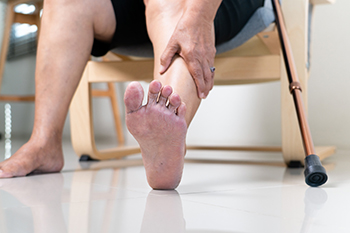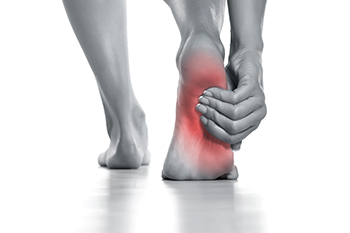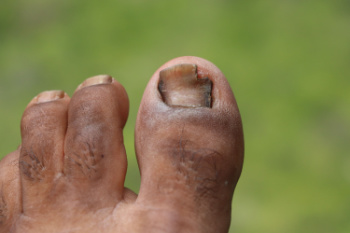Items filtered by date: May 2025
See Your Foot Specialist Regularly If You Work On Your Feet
Proper Foot Care and Common Foot Issues in Older Adults

Caring for the feet becomes increasingly important with age, as seniors are more prone to various foot issues that can affect mobility and overall well-being. Common concerns include ingrown toenails, which can cause pain and infection if not properly trimmed, and brittle toenails that may crack or break easily. Tingling or burning sensations in the feet may be signs of nerve issues or poor circulation. Foot pain and cracked heels can make walking uncomfortable and increase the risk of falls. Regular foot inspections, gentle cleaning, moisturizing, and wearing well-fitting shoes help prevent these problems. If you are elderly and have foot pain, it is suggested that you are under the care of a podiatrist who can treat various foot conditions, and help you to monitor your foot health.
If you need your feet checked, contact Evan Young, DPM of Trinity Foot & Ankle . Our doctor will attend to all of your foot and ankle needs and provide you with quality treatment.
Geriatrics and Podiatry
When people age, some common issues that may occur are bone density loss, dry skin, poor circulation, and rough brittle nails. These issues may also affect your foot health if the necessary steps are not taken to alleviate the problems.
It is important to take care of your feet because feet that are injured or diseased can affect your overall health. Having painful feet hinders your ability to do daily activities or may decrease your willingness to do the things that you need to do.
Visiting Your Geriatrician
As we age, health problems become more likely, so it is essential to visit your doctor for check-ups to ensure that you are doing the best you can to take care of your health. It is recommended to check your feet frequently for any possible cuts, bruises, swelling, corns or any other irregularities.
Taking Care of Elderly Feet
Cracked or dry feet can be treated by applying moisturizer often. It is also important not to wear old socks because the older the sock is, the higher the possibility there will be that there is bacteria there. Wear fresh socks and make sure they fit properly.
Proper foot health means that you can have a more active lifestyle and you will not be bogged down by pain. Foot health also leads to good circulation, which is paramount for overall health.
If you have any questions, please feel free to contact our office located in Trinity, FL . We offer the newest diagnostic and treatment technologies for all your foot care needs.
Managing Heel Pain

Heel pain is a common foot complaint and can stem from several conditions, including plantar fasciitis, stress fractures, or neuromas. Plantar fasciitis is an inflammation of the thick band of tissue running along the bottom of the foot, often causing sharp pain with your first steps in the morning. Stress fractures are tiny cracks in the heel bone due to overuse or repetitive activity, leading to persistent, aching pain. Neuromas are nerve issues that may cause burning, tingling, or numbness in the heel or arch. These conditions may feel like stabbing pain, deep aches, or electric-like shocks, depending on the cause. Without treatment, heel pain can worsen and affect your mobility. A podiatrist can diagnose the cause of your heel pain through physical exams, imaging, and gait analysis. Treatment options include custom orthotics, targeted exercises, anti-inflammatory medications, or, in some cases, minor procedures. If you are experiencing ongoing heel pain, it is suggested that you schedule an appointment with a podiatrist for appropriate treatment.
Many people suffer from bouts of heel pain. For more information, contact Evan Young, DPM of Trinity Foot & Ankle . Our doctor can provide the care you need to keep you pain-free and on your feet.
Causes of Heel Pain
Heel pain is often associated with plantar fasciitis. The plantar fascia is a band of tissues that extends along the bottom of the foot. A rip or tear in this ligament can cause inflammation of the tissue.
Achilles tendonitis is another cause of heel pain. Inflammation of the Achilles tendon will cause pain from fractures and muscle tearing. Lack of flexibility is also another symptom.
Heel spurs are another cause of pain. When the tissues of the plantar fascia undergo a great deal of stress, it can lead to ligament separation from the heel bone, causing heel spurs.
Why Might Heel Pain Occur?
- Wearing ill-fitting shoes
- Wearing non-supportive shoes
- Weight change
- Excessive running
Treatments
Heel pain should be treated as soon as possible for immediate results. Keeping your feet in a stress-free environment will help. If you suffer from Achilles tendonitis or plantar fasciitis, applying ice will reduce the swelling. Stretching before an exercise like running will help the muscles. Using all these tips will help make heel pain a condition of the past.
If you have any questions, please feel free to contact our office located in Trinity, FL . We offer the newest diagnostic and treatment technologies for all your foot care needs.
Types and Symptoms of Toenail Fungus

Toenail fungus, also called onychomycosis, usually occurs when tiny cracks in the nail or surrounding skin allow fungi to enter and grow. The most common types of toenail fungus include infections that start at the tip of the nail and move inward, infections that cause white patches across the surface, and infections that begin at the base of the nail and spread toward the tip. Symptoms include nails becoming thick, brittle, discolored, crumbly, or giving off an unpleasant odor. Risk factors for toenail fungus include older age, diabetes, poor circulation, and walking barefoot in public places like pool areas and gym locker rooms. A podiatrist can diagnose the infection by examining the infected toenail and testing a small sample, if needed. Treatment options generally start with antifungal medication, but in severe cases, surgery may be needed to remove the infected nail. If you believe you have a fungal toenail infection, it is suggested that you make an immediate appointment with a podiatrist for appropriate treatment.
If left untreated, toenail fungus may spread to other toenails, skin, or even fingernails. If you suspect you have toenail fungus it is important to seek treatment right away. For more information about treatment, contact Evan Young, DPM of Trinity Foot & Ankle . Our doctor can provide the care you need to keep you pain-free and on your feet.
Symptoms
- Warped or oddly shaped nails
- Yellowish nails
- Loose/separated nail
- Buildup of bits and pieces of nail fragments under the nail
- Brittle, broken, thickened nail
Treatment
If self-care strategies and over-the-counter medications does not help your fungus, your podiatrist may give you a prescription drug instead. Even if you find relief from your toenail fungus symptoms, you may experience a repeat infection in the future.
Prevention
In order to prevent getting toenail fungus in the future, you should always make sure to wash your feet with soap and water. After washing, it is important to dry your feet thoroughly especially in between the toes. When trimming your toenails, be sure to trim straight across instead of in a rounded shape. It is crucial not to cover up discolored nails with nail polish because that will prevent your nail from being able to “breathe”.
In some cases, surgical procedure may be needed to remove the toenail fungus. Consult with your podiatrist about the best treatment options for your case of toenail fungus.
If you have any questions please contact our office located in Trinity, FL . We offer the newest diagnostic and treatment technologies for all your foot and ankle needs.
Foot Development in Babies and Toddlers

Foot development in babies and toddlers follows a natural progression as they grow and begin to explore their environment. At birth, a baby’s feet are soft, flat, and mostly cartilage, with arches not yet fully formed. As babies start crawling and pulling up to stand, their feet strengthen and begin to take shape. During this stage, barefoot time is ideal for natural development and balance. When toddlers begin walking, soft-soled shoes that allow for flexibility and movement are recommended to protect the feet without restricting growth. As walking becomes more steady, supportive shoes with non-slip soles help provide stability. It is important to choose shoes that fit properly, offer enough room for the toes, and do not interfere with the natural growth and development of the feet. If you have concerns about your child’s foot development, it is suggested that you consult a podiatrist who can address any questions you may have.
Making sure that your children maintain good foot health is very important as they grow. If you have any questions, contact Evan Young, DPM of Trinity Foot & Ankle . Our doctor can provide the care you need to keep you pain-free and on your feet.
Keeping Children's Feet Healthy
Having healthy feet during childhood can help prevent medical problems later in life, namely in the back and legs. As children grow, their feet require different types of care. Here are some things to consider...
Although babies do not walk yet, it is still very important to take care of their feet.
Avoid putting tight shoes or socks on his or her feet.
Allow the baby to stretch and kick his or her feet to feel comfortable.
As a toddler, kids are now on the move and begin to develop differently. At this age, toddlers are getting a feel for walking, so don’t be alarmed if your toddler is unsteady or ‘walks funny’.
As your child gets older, it is important to teach them how to take care of their feet.
Show them proper hygiene to prevent infections such as fungus.
Be watchful for any pain or injury.
Have all injuries checked by a doctor as soon as possible.
Comfortable, protective shoes should always be worn, especially at play.
If you have any questions, please feel free to contact our office located in Trinity, FL . We offer the newest diagnostic and treatment technologies for all your foot care needs.

